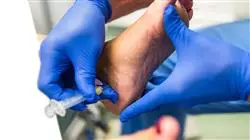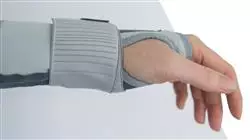University certificate
Scientific endorser

The world's largest faculty of medicine”
Introduction to the Program
The constant updating of knowledge will be key when it comes to the most advanced therapeutic management of sports injuries”

Decision-making when dealing with sports injuries is conditioned not only by the type and severity of the injury, but also by the clinical-functional situation of the athlete and their short, medium and long-term requirements, without losing sight of their own expectations and goals. For the most advanced therapeutic management of injuries, it is essential for physicians to have exhaustive knowledge of the advances in the different therapeutic modalities, their indications and expected results, as well as their possible complications.
This Postgraduate certificate takes a deep look into all these issues, devoting an entire topic to Regenerative Medicine, a growing discipline in the sports field, which seeks to optimize tissue recovery processes and is a safe and potentially effective alternative for musculoskeletal injuries related to sports, as well as for degenerative processes such as osteoarthritis.
It is a tailor-made program taught in a 100% online format, so physicians can choose the time and place that best suits their availability, schedules and interests. By means of a study method of proven efficiency, you will be able to perfect your skills in areas such as how emotion is involved in Psychoneuroimmunology.
With this Postgraduate certificate, you will have the flexibility to balance your academic life with your professional work”
This Postgraduate certificate in Therapeutic Management in Sports Injuries contains the most complete and up-to-date academic program on the market. Its most notable features are:
- Practical cases presented by experts in Sports medicine
- The graphic, schematic, and eminently practical contents with which they are created, provide scientific and practical information on the disciplines that are essential for professional practice
- Practical exercises where self-assessment can be used to improve learning
- Its special emphasis on innovative methodologies
- Theoretical lessons, questions to the expert, debate forums on controversial topics, and individual reflection assignments
- Content that is accessible from any fixed or portable device with an Internet connection
This course will bring you up to speed in a wide range of physical and pharmacological methods and therapies used in treatment and functional recovery programs for injured athletes”
The program’s teaching staff includes professionals from the sector who contribute their work experience to this training program, as well as renowned specialists from leading societies and prestigious universities.
The multimedia content, developed with the latest educational technology, will provide the professional with situated and contextual learning, i.e., a simulated environment that will provide immersive training programmed to train in real situations.
The design of this program focuses on Problem-Based Learning, which means the student must try to solve the different real-life situations of that arise throughout the academic program. For this purpose, the student will be assisted by an innovative, interactive video system created by renowned and experienced experts.
This Postgraduate certificate is your best option if you want become familiar with the latest advances in regenerative medicine"

With this program, you will delve deeper into the most important developments regarding nerve blocks and radiofrequency"
Why study at TECH?
TECH is the world’s largest online university. With an impressive catalog of more than 14,000 university programs available in 11 languages, it is positioned as a leader in employability, with a 99% job placement rate. In addition, it relies on an enormous faculty of more than 6,000 professors of the highest international renown.

Study at the world's largest online university and guarantee your professional success. The future starts at TECH”
The world’s best online university according to FORBES
The prestigious Forbes magazine, specialized in business and finance, has highlighted TECH as “the world's best online university” This is what they have recently stated in an article in their digital edition in which they echo the success story of this institution, “thanks to the academic offer it provides, the selection of its teaching staff, and an innovative learning method aimed at educating the professionals of the future”
A revolutionary study method, a cutting-edge faculty and a practical focus: the key to TECH's success.
The most complete study plans on the university scene
TECH offers the most complete study plans on the university scene, with syllabuses that cover fundamental concepts and, at the same time, the main scientific advances in their specific scientific areas. In addition, these programs are continuously being updated to guarantee students the academic vanguard and the most in-demand professional skills. In this way, the university's qualifications provide its graduates with a significant advantage to propel their careers to success.
TECH offers the most comprehensive and intensive study plans on the current university scene.
A world-class teaching staff
TECH's teaching staff is made up of more than 6,000 professors with the highest international recognition. Professors, researchers and top executives of multinational companies, including Isaiah Covington, performance coach of the Boston Celtics; Magda Romanska, principal investigator at Harvard MetaLAB; Ignacio Wistumba, chairman of the department of translational molecular pathology at MD Anderson Cancer Center; and D.W. Pine, creative director of TIME magazine, among others.
Internationally renowned experts, specialized in different branches of Health, Technology, Communication and Business, form part of the TECH faculty.
A unique learning method
TECH is the first university to use Relearning in all its programs. It is the best online learning methodology, accredited with international teaching quality certifications, provided by prestigious educational agencies. In addition, this disruptive educational model is complemented with the “Case Method”, thereby setting up a unique online teaching strategy. Innovative teaching resources are also implemented, including detailed videos, infographics and interactive summaries.
TECH combines Relearning and the Case Method in all its university programs to guarantee excellent theoretical and practical learning, studying whenever and wherever you want.
The world's largest online university
TECH is the world’s largest online university. We are the largest educational institution, with the best and widest online educational catalog, one hundred percent online and covering the vast majority of areas of knowledge. We offer a large selection of our own degrees and accredited online undergraduate and postgraduate degrees. In total, more than 14,000 university degrees, in eleven different languages, make us the largest educational largest in the world.
TECH has the world's most extensive catalog of academic and official programs, available in more than 11 languages.
Google Premier Partner
The American technology giant has awarded TECH the Google Google Premier Partner badge. This award, which is only available to 3% of the world's companies, highlights the efficient, flexible and tailored experience that this university provides to students. The recognition as a Google Premier Partner not only accredits the maximum rigor, performance and investment in TECH's digital infrastructures, but also places this university as one of the world's leading technology companies.
Google has positioned TECH in the top 3% of the world's most important technology companies by awarding it its Google Premier Partner badge.
The official online university of the NBA
TECH is the official online university of the NBA. Thanks to our agreement with the biggest league in basketball, we offer our students exclusive university programs, as well as a wide variety of educational resources focused on the business of the league and other areas of the sports industry. Each program is made up of a uniquely designed syllabus and features exceptional guest hosts: professionals with a distinguished sports background who will offer their expertise on the most relevant topics.
TECH has been selected by the NBA, the world's top basketball league, as its official online university.
The top-rated university by its students
Students have positioned TECH as the world's top-rated university on the main review websites, with a highest rating of 4.9 out of 5, obtained from more than 1,000 reviews. These results consolidate TECH as the benchmark university institution at an international level, reflecting the excellence and positive impact of its educational model.” reflecting the excellence and positive impact of its educational model.”
TECH is the world’s top-rated university by its students.
Leaders in employability
TECH has managed to become the leading university in employability. 99% of its students obtain jobs in the academic field they have studied, within one year of completing any of the university's programs. A similar number achieve immediate career enhancement. All this thanks to a study methodology that bases its effectiveness on the acquisition of practical skills, which are absolutely necessary for professional development.
99% of TECH graduates find a job within a year of completing their studies.
Postgraduate Certificate in Therapeutic Management in Sports Injuries
Therapeutic management of sports injuries is a comprehensive approach used to evaluate, treat and prevent sports-related injuries. The primary goal of therapeutic sports injury management is to help the patient recover from their injury and return to their pre-injury level of activity.
Therapeutic management of sports injuries includes a variety of treatments, which may include physical therapy, rehabilitation, medications, medical procedures and, in some cases, surgery. Specific treatment options will depend on the type and severity of the injury.
Early evaluation and identification of an injury is essential for successful therapeutic management. Early treatment and medical care can prevent future complications and promote a faster recovery. Therapeutic management of sports injuries may also include lifestyle changes, such as rest, icing to reduce inflammation, and practicing rehabilitative exercises.
Physical therapy and rehabilitation are major components of therapeutic management of sports injuries. Physical therapists help the patient regain strength, flexibility and range of motion through specific exercises and manual therapies. The rehabilitation program will be specifically designed based on the nature and severity of the injury.
In some cases, especially in severe or chronic injuries, medication may be part of the treatment. Medications may be used to reduce pain and inflammation, improve the stage of recovery and create a healing environment suitable for the injury.
In more severe situations, medical procedures and surgery may be necessary. Medical procedures may include corticosteroids or more complex injections for healing of the injury. Surgery is considered a definitive option when other options are not effective.
Therapeutic management of sports injuries is a comprehensive approach that seeks to prevent, evaluate and treat sports-related injuries. This treatment may include physical therapy, rehabilitation, medications, medical procedures and in some cases, surgery. The goal is to promote optimal recovery and allow the patient to return to his or her previous level of activity prior to the injury.







